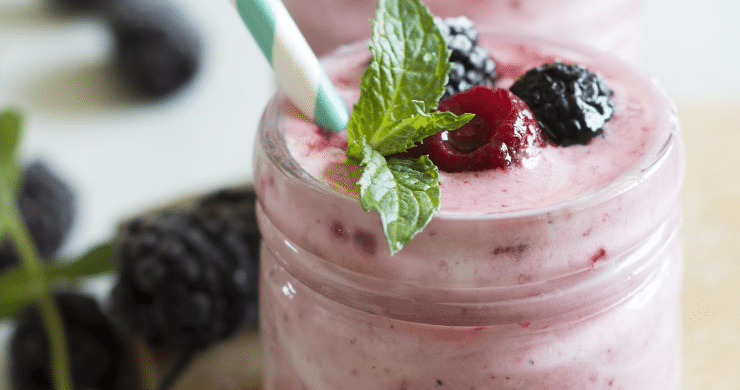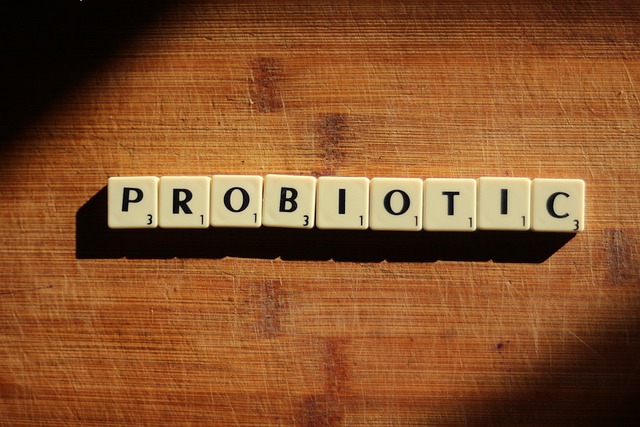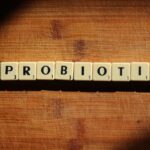Probiotics, Prebiotics and Synbiotics
The topic of gut health is currently receiving a lot of attention in the field of wellness. As evidenced by the numerous experts and influencers on TikTok, discussions surrounding digestion are becoming commonplace. However, if terms such as microbiome and flora are still unfamiliar, it’s likely that distinguishing between probiotics and prebiotics is also perplexing.
Prebiotics are a kind of indigestible fiber that act as nourishment for living microorganisms, such as bacteria and yeast, known as probiotics. The gut can benefit from both prebiotics and probiotics as they help sustain helpful bacteria and other organisms.
A synbiotic refers to a dietary source that simultaneously includes prebiotics and probiotics. Examples of synbiotic foods are various kinds of yogurt, kefir, and cheese. Additionally, prebiotics are available for purchase in the form of commercial food additives or supplements, which can be found in liquid or powder formats.

The prevalence of these terms is widespread, and the hype surrounding them is influencing people’s attitudes towards well-being. The International Food Information Council’s 2022 study on food and health reveals that 29% of Americans are keen on enhancing their gut health, with 33% opting for probiotic supplements to achieve this.
Food companies are beginning to focus on probiotic products such as fruit snacks and trail mix. However, prebiotic items like protein bars and sparkling water are also starting to appear in stores.
The topic of gut health commonly centers around probiotics, which are typically referred to as beneficial bacteria and yeasts that reside inside and on your body. Although scientists continue to investigate the capabilities of these advantageous microorganisms, they have received accolades for enhancing digestive health and fortifying the immune system.
However, probiotics do not function in isolation, and this is where prebiotics, a term that is frequently mistaken for probiotics, play a crucial role. Furthermore, comparable to how flowers in a garden require fertilizer to develop and survive, probiotics require fuel to flourish and thrive. This is where prebiotics come in by supplying plant fibers that stimulate the growth of probiotics in your intestinal tract, allowing them to multiply and produce a more varied community of gut bacteria as per the Mayo Clinic.
Although probiotics and prebiotics complement each other, their impact on the body may differ significantly. However, to fully comprehend the significance of all this, it’s crucial to examine why it’s relevant initially.
It all starts with your gut microbiome, which is basically its own world.
According to SELF, the digestive tract houses a wide range of microbes comprising bacteria, fungi, viruses, and parasites amounting to trillions in number, collectively known as gut microbiome. Curtis Huttenhower, PhD, who co-directs the Harvard Chan Microbiome in Public Health Center, describes it as a diverse community.
At one extreme, there are microorganisms that promote your health. In the center are some indifferent microbes that have little impact on your well-being, while at the other extreme, there are certain microorganisms that can be dangerous, especially if they flourish and establish themselves.
It’s when you get a disruption or an imbalance in that normal makeup that things may get dicey. A shift in your gut microbiota can lead to something called dysbiosis, and that can potentially cause the immune system to become hypersensitive in some people.
Experiencing diarrhea, abdominal pain, and bloating are some typical gastrointestinal symptoms that can occur. However, it’s important to note that what may be considered normal or healthy for one person may differ for another due to individual differences.
According to Jessie Wong, RDN, who focuses on digestive health and irritable bowel syndrome, having a diverse range of microorganisms in your gut is crucial for maintaining balance and aiding in the fight against harmful pathogens.
Probiotics have gained a high reputation for assisting with rebalancing.
Probiotics
An international panel of experts came to a consensus regarding the definition of probiotics as “live microorganisms that, when given in sufficient amounts, promote health benefits in the host.” It should be noted that the host refers to you.
The most common reference to probiotics pertains to dietary probiotics, which are naturally occurring in food sources. Bacteria strains, like Lactobacillus or Bifidobacterium, are usually utilized in the food fermentation process. A few examples of quality sources of probiotics are:
- Kimchi
- Gochujang
- Sauerkraut
- Miso
- Pickles
- Natto
- Yogurt
- Kefir

Fermented foods introduce microbes into your digestive system, which undergo elimination in the stomach, following which, the surviving microbes reach the small intestine. Some of them pass through this process.
According to Wong, the microbes remain in the colon for a period of time, which varies based on the structure and environment of your gut. This area is inhabited by a variety of microbial species.
According to Dr. Huttenhower, once probiotics reach your gut, they release helpful chemicals that boost your immune system and prevent the growth of harmful bacteria. As for the prebiotics, these are broken down by the probiotics, and the resulting fermentation byproducts – such as short-chain fatty acids – nourish your intestinal cells and promote a strong intestinal barrier, Wong explains.
It is crucial as a functional barrier acts as a protective boundary that prevents detrimental bacteria and substances from entering your body.
Dr. Huttenhower suggests that in addition to probiotics found in certain foods, there is a new category of probiotics known as live biotherapeutic probiotics (LBPs). These LBPs are in the initial stages of creation and are designed to inhabit the gut and provide benefits to individuals with particular health concerns like inflammatory bowel disease (IBD), such as Crohn’s and ulcerative colitis or Clostridioides difficile infection.
Although the research on the impacts of probiotics is unclear, indications show that they could have advantages in the following domains:
The health of one’s digestive system.
Several research studies have indicated that probiotics can enhance digestive health for certain individuals. A Cochrane review conducted in 2017 determined that the intake of probiotics alongside antibiotics resulted in a 60% decrease in the likelihood of experiencing diarrhea related to antibiotic usage.
In 2014, a study conducted on 24 trials revealed that probiotics may be helpful in preventing necrotizing enterocolitis, a deadly disease among premature infants.
The state of psychological well-being.
There is some evidence to suggest that probiotics could enhance mental well-being. According to a 2017 study, probiotics could reduce depression symptoms; however, the researchers point out that more research is required to validate this.
The correlation between gut and brain health may be the reason why probiotics can have such an impact.
Optimal functioning of the digestive system.
Probiotics may offer improvements for individuals with stomach and intestinal disorders, according to studies.
A review of trials conducted on individuals with irritable bowel syndrome (IBS) revealed that probiotics have the potential to alleviate the symptoms of this condition, according to a systematic study. However, the authors have expressed concerns about the degree of benefit as well as the most effective probiotic strain.
Overall well-being
In 2017, a group of authors conducted a review of 17 Cochrane reviews to evaluate the proof in favor of the possible advantages of probiotics.
It has been discovered that probiotics have the potential to reduce:
- the need for antibiotics
- school absences from colds
- the incidence of ventilator-assisted pneumonia
- gestational diabetes
- vaginal infections, such as yeast infections
- eczema
Despite conducting a review, there was a lack of conclusive evidence supporting the notion that probiotics can avert illness. As a result, the authors suggest that additional trials are needed.
Side effects
As per the aforementioned review, there was an increased likelihood of negative effects in individuals with Crohn’s disease who consumed a particular probiotic. Likewise, those with compromised immune systems were more susceptible to adverse reactions.
According to additional research conducted by the National Center for Complementary and Integrative Health, it is believed that probiotics could pose a risk for individuals with severe pre-existing health conditions. An analysis of probiotic trials from 2018 cautioned that numerous studies fail to disclose safety information, such as adverse events, despite asserting the efficacy of probiotics.
Since there is insufficient information regarding the safety of probiotics, particularly in terms of possible long-term effects, scientists have limited knowledge about its risks. Those who are worried about potential adverse reactions should consult a doctor before significantly ramping up their probiotic consumption.
Prebiotics
Plant fibers or carbohydrates in food that the gut ferments to create advantageous chemicals are known as prebiotics.
According to Wong, studies show that ingesting fermentable fibers nourishes helpful microorganisms in your gut, leading to the proliferation and fortification of beneficial bacteria, namely Lactobacillus and Bifidobacterium, which take up more space on the surface of your intestinal lining.
Dr. Huttenhower explains that the objective of prebiotics is to stimulate the development of beneficial bacteria that already exist. Since prebiotic fibers are not assimilated in the stomach or small intestine, they are broken down by microorganisms in the colon, which promotes their growth. The desired outcome is a well-rounded and healthy gut microbiome.
The positive aspect is that a variety of fiber-rich foods are a frequent source of dietary prebiotics.
- Whole grains, such as quinoa, buckwheat, rice, corn, and pasta
- Herbs, spices, and seasonings like garlic and onions
- Vibrant vegetables and fruits, like leafy greens, sweet potatoes, eggplant, artichokes, tomatoes, strawberries, blackberries, blueberries, butternut squash, cauliflower
In order to broaden your sources, Wong suggests incorporating various options into each meal. As an example, she suggests swapping rice for quinoa or pasta sometimes instead of always having it as a side dish at dinner. Additionally, you could mix up the fruits and vegetables you add to your smoothies.
Consider changing up your salad toppings occasionally by swapping out tomatoes for alternatives like bell peppers, roasted zucchini, or berries, as recommended by Wong. Moreover, Wong advises including a serving of fruit with every meal and adding two different types of vegetables to your lunch and dinner whenever feasible.
Certain foods contain prebiotics which cannot be digested by the body but are instead consumed by beneficial gut bacteria and organisms. The effects of prebiotics closely relate to those of probiotics, with potential advantages such as improved digestive health, reduced antibiotic-related health issues, and additional benefits.
There is a lack of research regarding prebiotics, which makes it unclear how much they contribute to improving health. Scientists have not yet confirmed the purported benefits of probiotics.
According to certain studies, the body could potentially reap benefits from prebiotics, such as:
- improving calcium absorption
- changing how quickly the body can process carbohydrates
- supporting the probiotic growth of gut bacteria, potentially enhancing digestion and metabolism
As prebiotics are found in a variety of foods, there is no necessity for individuals to rely on prebiotic supplements.
At present, there is no proof indicating harm when taking prebiotics and probiotics simultaneously. Nevertheless, individuals with long-term medical conditions or severe ailments should refrain from using prebiotic or probiotic supplements unless recommended by a healthcare provider.
Further exploration is needed for research into the adverse impacts of prebiotics since it is still in its early stages.
Probiotics require prebiotics as a source of sustenance, hence access to prebiotics is necessary for their optimal functioning. Studies investigating the relationship between prebiotics and probiotics are underway, but it remains uncertain if prebiotic intake can assist in the growth of probiotics.
Consuming a well-rounded and nutritious diet provides individuals with an abundance of prebiotics and probiotics through their food.
Probiotic foods
A variety of foods comprise high levels of probiotics, such as:
- yogurt
- kefir
- fermented foods, such as sauerkraut and kimchi
- kombucha
- traditional fermented buttermilk
- fermented cheeses, such as Gouda
Prebiotic foods
People can consume a diverse range of prebiotics that can fuel different strains of bacteria by incorporating a variety of foods into their diet. Many high-fiber foods such as certain fruits, vegetables, and whole grains contain prebiotics.
Prebiotics can be found in certain foods that are also rich in probiotics. Breast milk provides babies with prebiotics through its sugar content, and prebiotics are also included in some types of infant formula.
Unless an individual has a compromised immune system or underlying medical conditions, consuming prebiotic or probiotic supplements typically carries minimal risk, although they are not necessary for most healthy individuals.
Consuming a diverse range of fruits, vegetables, whole grains, and fermented foods in one’s diet can provide ample prebiotics and probiotics, negating the need for supplementary options. If one requires tailored dietary recommendations, consulting with a physician or nutrition expert is advised.



